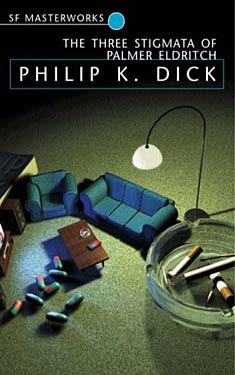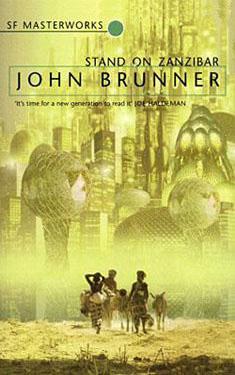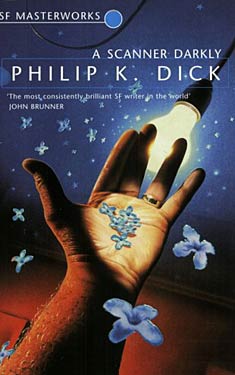With 102 books published in the series so far, though, you may wonder where to start! To held a helping hand, I am choosing 6 books in the series that I've read and think you should too. Because this list only has 6 selections, I had to make some tough decisions. One of them was to buck @nerds_feather tradition and add an honorable mention (sorry, I couldn't help myself). I also decided to skip over worthy and justifiably famous selections like Dune and The Forever War in favor of books that may be a little more obscure, but are equally brilliant. My tastes range towards the weird, so keep that in mind as well. But that's not why they're here. Rather, it's because each and every one of these books epitomizes the strength and power of the science fiction medium.
Without further ado, the list...
The SF Masterworks series loves them some PKD, and so it seemed natural to pick my favorite of his 1960s novels for an honorable mention. I mean, you've got global warming; dueling industrialists; drugs called can-D and chew-Z; space colonization; and a reality melting finale...what's not to like about that? Though sharing a lot of thematic ground with the more famous Ubik (1966), I'd argue that Palmer Eldritch is the superior book. Why? Because of how very funny it is, until it's gets all freaky and metaphysical. Then it's just awesome.
Eco-dystopias were popular in the late '60s and early '70s, and there were arguably none better than Brunner's 650 page masterpiece. Set in a version of 2010 that today feels simultaneously futuristic, antiquated and just plain realistic, Stand on Zanzibar works best when read as an alternate history of the present. In a way, it's proto-cyberpunk, though it's also a lot more than that. A fragmented narrative helps Brunner explore issues of overpopulation, exploitation, excessive corporate influence, cultural decay and nihilism in soaring, if also sprawling, fashion. Oh, and there's the fact that it's really, really well written.
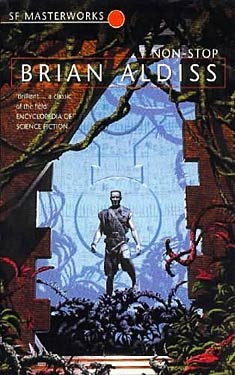
5. Brian Aldiss - Non-Stop (SFM #33, 1958)
Aldiss is a guy who really cranked out the books, and a lot of them aren't much to speak of. Non-Stop, though, is an interesting take on the generation starship idea, where humans have evolved into shorter beings living in warring, tribal communities--not even knowing they are on a ship. But for a few of the "dizzies," the truth begins to emerge. It may not be as well-written as some of the other selections here, but it will really stick in your head like the best SF tends to do. Plus it features one of the most chilling concepts I've encountered in SF: highly-evolved, intelligent rats. You see, rats are just like us--only dumber yet hardier. If they evolve sentience, we're pretty much done. HAIL RATS.
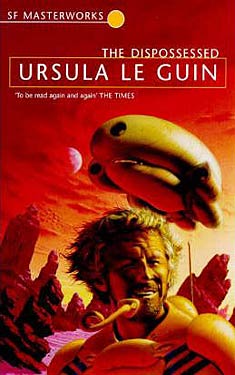 4. Ursula K. LeGuin - The Dispossessed (SFM #16, 1974)
4. Ursula K. LeGuin - The Dispossessed (SFM #16, 1974)
Le Guin is best known for her "anthropological SF," where human narrators come to terms with the social implications of contact with non-human species. Arguably her best novel, though, is the more "sociological" Dispossessed. It may seem dated in some ways, reflecting as it does a peculiar Cold War mentality, but the Dispossessed is a fascinating rumination on the idea of utopia, its essential unattainability and the almost inevitable bureaucratization of revolutionary movements once they pass from the phase of critique to one of governance--yet the reader never loses sight of what made the utopian ideal attractive either. And that's just the tip of the iceberg as well...
3. Philip K. Dick - A Scanner, Darkly (SFM #20, 1977)
Future 1994 California is a lot like actual 1994 California, only narcotics agents wear these things called "scramble suits" that aid undercover work but also, when combined with copious drug-taking, indelibly blur the line between realities, allowing said agents to undertake the real undercover work, at creepy rehab clinics. This is Dick at his absolute, undeniable best. This is serious f***ing literature, and up there with Pynchon in any discussion of mind-bending conspiracy fiction. Ignore the fact that there's a film starring Keanu Reeves based on it, and just go read the book already.
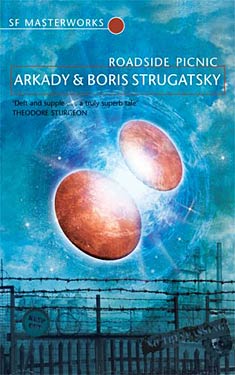
2. Arkady and Boris Strugatsky - Roadside Picnic (SFM # 68, 1972)
This classic of Soviet SF shows us a post-visitation world where human "stalkers" venture into radioactive "zones" left by the visitors, looking for and finding all kinds of swag. It's a complicated, experimental novel, set in an original world populated with unforgettable characters. It's also the type of book where what you get out of it depends, in part, on you not reading wiki summaries or other spoilers. In the end, this is one of the most profound, challenging novels of any kind that I've ever read. It's also, to my knowledge, the only thing by the Strugatskys currently available in English. That sucks.
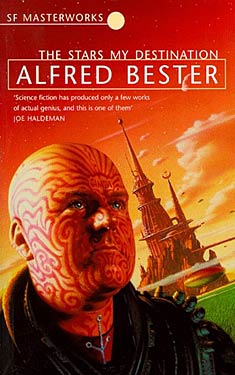 1. Alfred Bester - The Stars, My Destination (SFM #5, 1956)
1. Alfred Bester - The Stars, My Destination (SFM #5, 1956)Whenever I'm privy to one of those "what's the greatest SF book ever" conversations, I always say you can't credibly participate unless you're read The Stars, My Destination. Indeed, there's so much going on in this book that I can't possibly do justice to it in such a small space. Suffice to say, nothing in SF was the same after its publication. Everyone from Samuel Delany to Joe Haldeman has paid tribute to its genius, and everything from cyberpunk to PKD's late-60s freak-outs owe a massive debt to this dense, wonderful, epic novel. Gully Foyle is the original SF antihero, and to this day the greatest character I've ever encountered in science fiction.
...and that's all folks. Tell me why I'm wrong in the comments!
